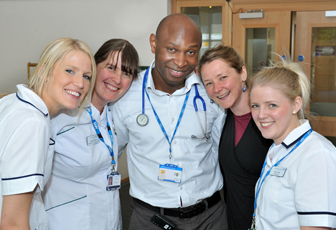Diabetes Team
A service is provided to those patients diagnosed with diabetes who have active, high or moderate foot risk according to NICE Guideline 19 (2015) 'Diabetic Foot Problems: Prevention & Management.' Patients with neuropathy and / or impaired circulation or one or more risk factor should be referred to the Podiatry Department for triage and screening. Active foot problems including ulceration with or without infection or suspected Charcot should be referred immediately for urgent triage, assessment and treatment. Please download the Diabetes Referral Pathway.
Rheumatology Team
The Rheumatology Team run specialist clinics for patients with an active rheumatological / connective tissue disease, who are seen by a rheumatology consultant, should be referred to the department for triage and screening.
Musculoskeletal Team (MSK)
The MSK Team provide advice and / or treatment as appropriate to children and adults with pain or deformity in their feet or legs stemming from muscles, bones, joints and related soft tissue.
Neurology Team
The Neurology Team provide a service at Leamington Hospital, as well as the community clinics. They aim to provide: lower limb stability, in order to assist in mobility; prevent falls through footwear; hosiery advice; and simple orthotics.
Nail surgery
A specialist service in the community providing the option of permanent removal or treatment of ingrown toenails for adults and children using a local anaesthetic.
Podiatry at home
Patients must be housebound to access this service and meet the department's criteria for treatment. We can advise you on how to contact Community Transport to bring you to your appointment.







